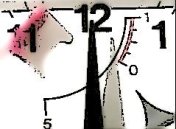by Christiaan (Mossel Bay, Western Cape, South Africa)
What if you are in a tournament and one brings one’s own clock,and your opponent does not want to play with it.
Is there a rule that supports the fact that one must play if the one player brings a clock?
———Admin —————
Hi Christiaan,
In every chess tournament chess clocks are used, of course. Otherwise an opponent can think about a move as long as he likes. Without chess clocks no chess tournament can be executed.
If a player refuses to use a clock then he will not be allowed to participate in the tournament.
If someone does not bring his clock then the organizer has to find and use another clock for this game.
If your opponent refuses to use a chess clock then go to the arbiter and inform him about this. He will then do whatever is necessary. It is his job to handle complaints.
Time Limits
There are time limits for each game. For example Rapidplay is played with typical time limits of 30 minutes for each player for all the moves.
Usually Blitz is played with time limits of 5 minutes for each player for all the moves.
Slow games are played 1 hour to 2 1/2+ hours per player.
Long tournament games in official chess tournaments can last up to five hours or longer.

- The player with the black pieces decides on which side of the chess board the clock will be placed. Most players are right-handed so they will choose the right hand side.
- The player with the black pieces starts White’s clock, by pressing a button. After this White’s timer starts counting down.
- After you have made your move always use the same hand to press the button. You are not allowed to make the move, for example, with your right hand and then press the button with your left hand.
- It is not allowed to manipulate the clock with your hands during the game or touching the clock with one hand while thinking about your next move.
- It is not allowed to keep bashing the clock with brute force after making your move.
- Checkmate counts first. If you run out of time but have given a checkmate, you win. If your opponent claims fall of your flag before you can execute your move to give a checkmate then you lose on time.
Read more about chess clocks at Wikipedia
 Sick of Losing at Chess? Get Chess Courses from a Grandmaster! HUGE Discount! Click here!
Sick of Losing at Chess? Get Chess Courses from a Grandmaster! HUGE Discount! Click here!Get Chess Course -Beginners Package- from a Grandmaster! Huge Discount!
Privacy Policy Impressum/Disclosure Disclaimer Donate
© 2008- www.Expert-Chess-Strategies.com
